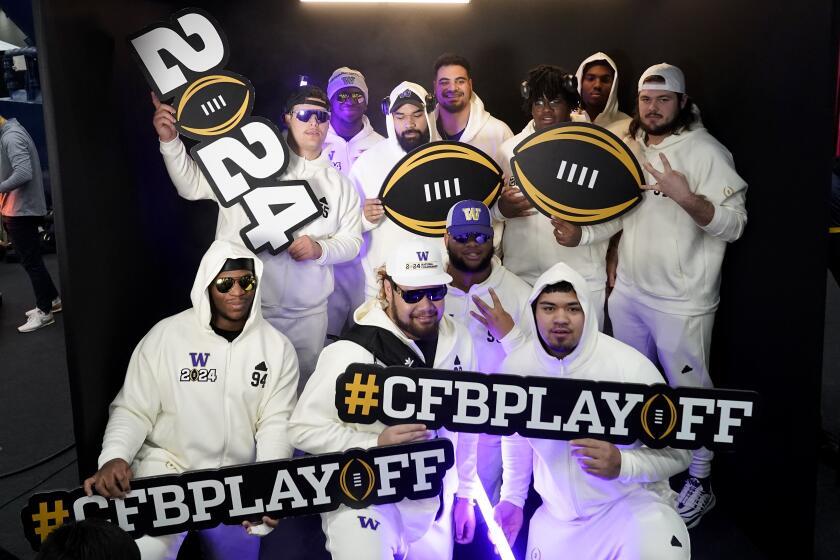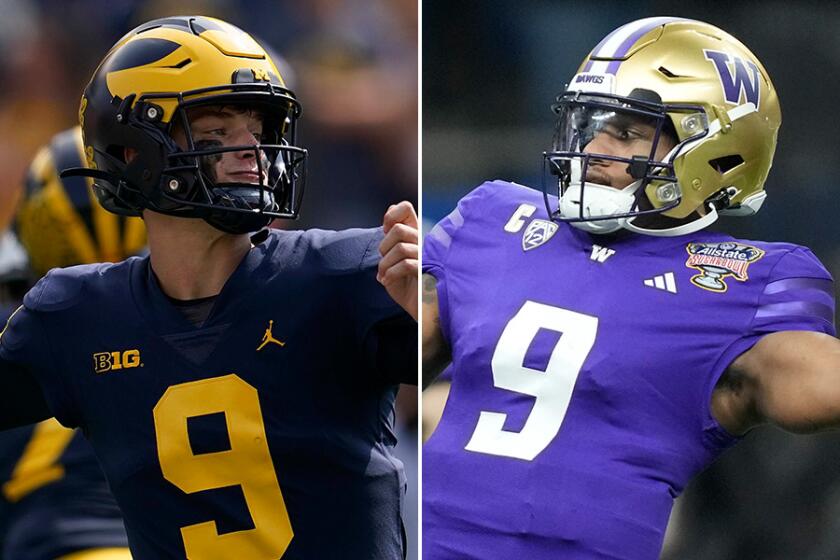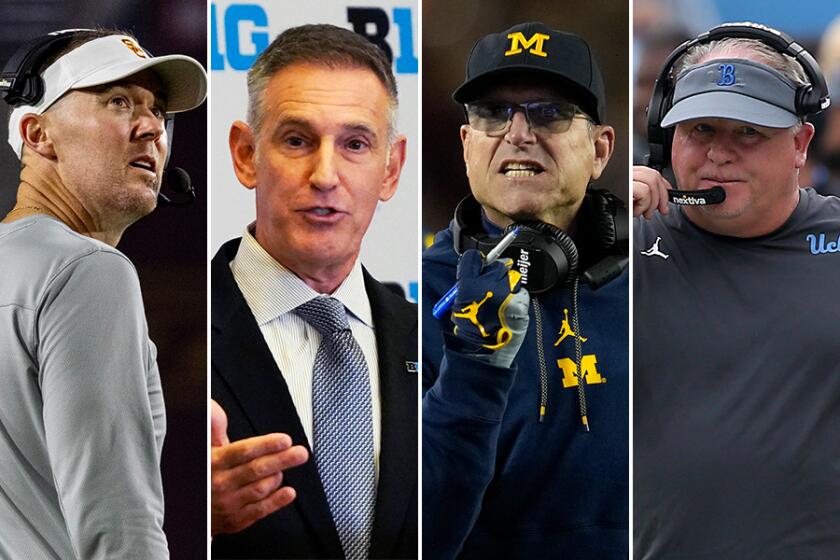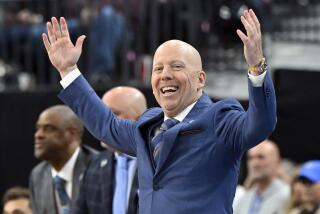Courtney Morgan is the L.A. guy who helped turn Michigan and Washington into CFP finalists
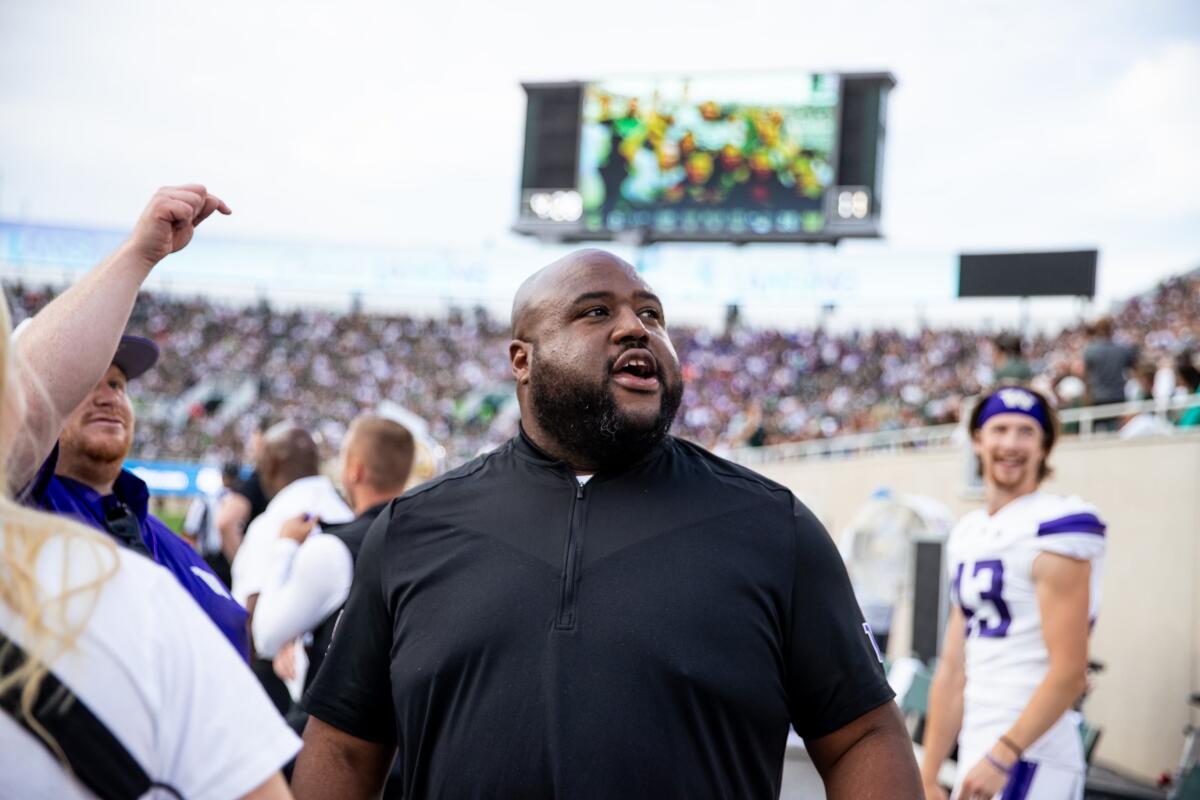
- Share via
HOUSTON — In December 2021, Courtney Morgan finally had it all — or at least it seemed that way.
He was back at Michigan as Jim Harbaugh’s director of player personnel, helping to construct the roster of the program that once built him from an inner-city Los Angeles kid into a worldly young man who was ready to conquer life after football. The Wolverines had just beaten Ohio State for the first time in a decade, and Morgan had worked to secure what would be a top-10 class for Michigan.
But one night, Morgan’s phone buzzed. It was Fresno State coach Kalen DeBoer, whom Morgan had worked for during the pandemic season in 2020. DeBoer had vowed to Morgan that he was going to hire him again, and, sure enough, he was now calling Morgan to tell him he was taking the Washington job and hoping to sway him back to the West Coast.
DeBoer knew it wasn’t going to be easy. This was Michigan, Morgan’s first love.
The Big Ten that Washington, along with USC and UCLA, are joining is in a contentious state. Could the national championship game start the healing process?
“I haven’t talked to anybody, you’re the first person I am calling who I’m doing this with. What’s it going to take to get you to come?” Morgan recalls DeBoer saying.
“Let me think about it,” Morgan told him.
Morgan was truly torn. He had known Michigan’s athletic director, Warde Manuel, since he was 17.
“Every day I walked through that building, it was just like home,” Morgan said. “So a lot of crazy emotions. My gut told me, look, this is Michigan. Whatever happens at Michigan, people are always gonna say, ‘Well, it’s Michigan.’ You go to Washington, I can put my stamp and build something we can take credit for. Because Michigan people expect you to be doing Michigan things.”
DeBoer had told Morgan that he would create a new position for him at Washington — general manager — a role that was crafted with managing the new complexities of name, image and likeness as well as the transfer portal.
“He said I want you to be a pillar in my program,” Morgan says. “At the end of the day, I couldn’t say I was a pillar in the program [at Michigan]. That’s big.”
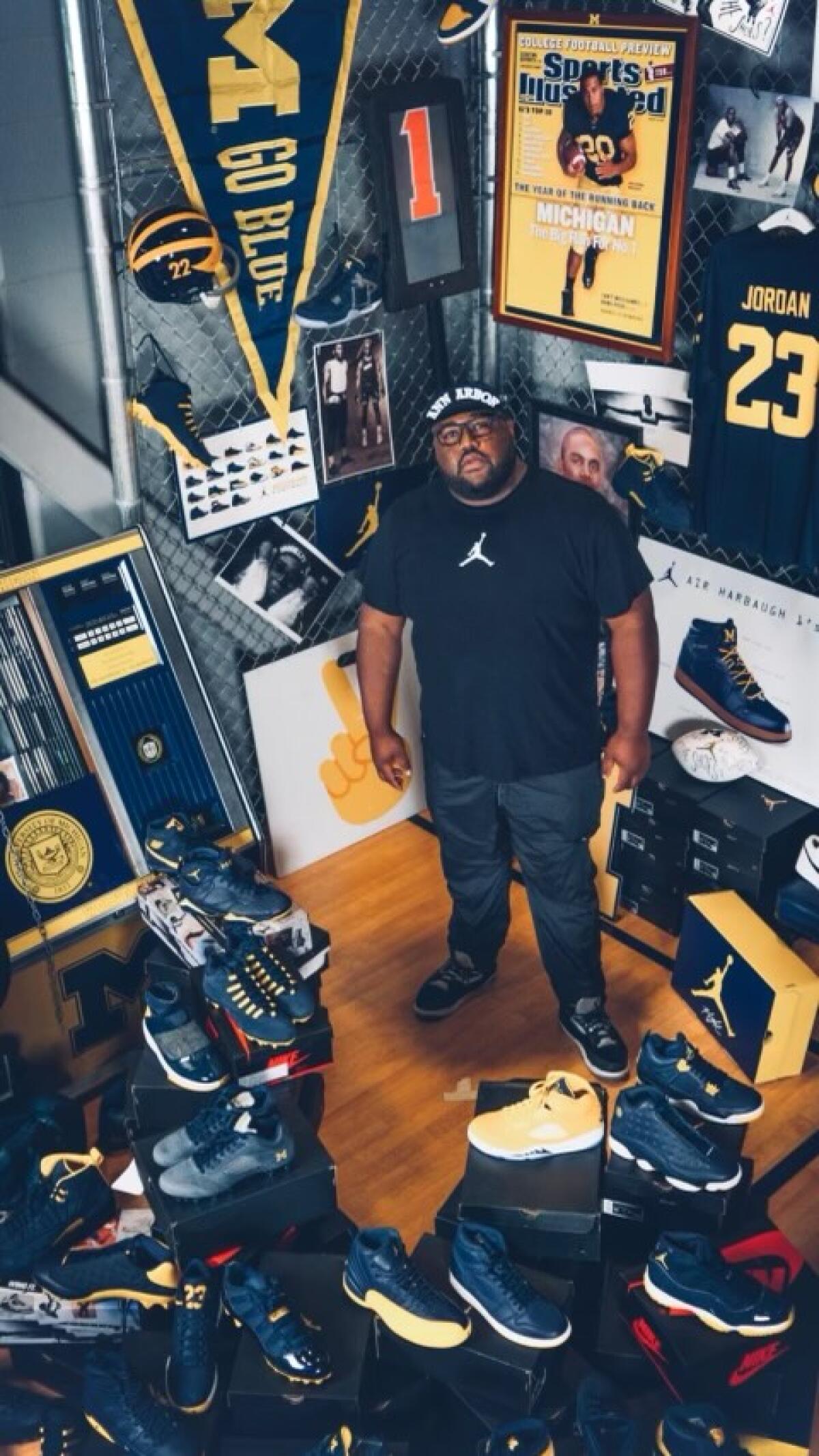
It was time to have some tough conversations. He had been at Michigan for less than a year, and now he was leaving?
“People couldn’t understand it,” Morgan says. “I took a lot of heat. From Warde, a lot of people. I thought I severed a lot of ties. People were pretty upset. Lloyd Carr texted me in all caps. People were genuinely disappointed in me. They thought I turned my back on the school.”
Even Morgan’s late mother, Iris, told him she didn’t agree with the decision.
“I’ve always been a person, in my life, I always bet on myself,” Morgan says. “And I believed in Kalen DeBoer.”
These days, with Washington 14-0 and one win away away from the program’s first national championship since 1991, Morgan’s intuition is looking pretty smart. That the last victory would have to come against Michigan makes things a little awkward.
“Honestly, a lot of people are proud of me,” Morgan says. “I bet on myself and people are looking at me and saying, ‘Man, you knew something we didn’t.’”
The story of how Morgan finds himself at the top of the college football world, a builder of the nation’s top two teams, began back home in L.A.
After Morgan’s football career ended at Michigan, the gritty offensive lineman did not over-pursue an NFL career when it was clear he wasn’t going to be a priority for teams. He quickly pivoted to the business world, where he was thriving in medical sales.
But, around 2012, he started feeling the pull back to football. He began to scratch the itch by volunteering with a Baldwin Hills youth league team, and before long he was working with young offensive linemen at B2G, a football skill training company in L.A. There, Morgan gained confidence in his ability to identify talent and connect with players on a deeper level.
Here’s everything you need to know about the College Football Playoff championship game between Michigan and Washington at NRG Stadium in Houston on Monday.
Through B2G, Morgan formed a relationship with Adrian Klemm, the offensive line coach at UCLA. Klemm advised UCLA coach Jim Mora to hire Morgan to a entry-level position.
The proposition meant Morgan leaving a corporate job paying him about $150,000 a year to make $680 every two weeks. It was one of many bets he’d make on himself in the coming years.
“I was almost homeless,” Morgan says. “That’s how bad I wanted to be back in football. A lot of people want to take the elevator up, but I slept in offices, I slept in locker rooms. I remember sleeping in the players’ lounge, getting woken up by the janitorial staff in the middle of the night so they can clean the room. The whole time, I’m like, ‘What am I doing?’”
Right as Morgan was trying to find his footing at UCLA, he experienced a personal heartbreak. Charles Drake, a fellow Westchester High alum who joined Morgan at Michigan, committed suicide in July 2012.
“It was the darkest time of my life,” Morgan says. “His death showed me that football has always been there for me. I know the game doesn’t lie. It gives you what you put into it.
“My parents divorced when I was in ninth grade, and my mom lost our house. The only thing that got me through was football. It has always allowed me to turn any pain into passion.”
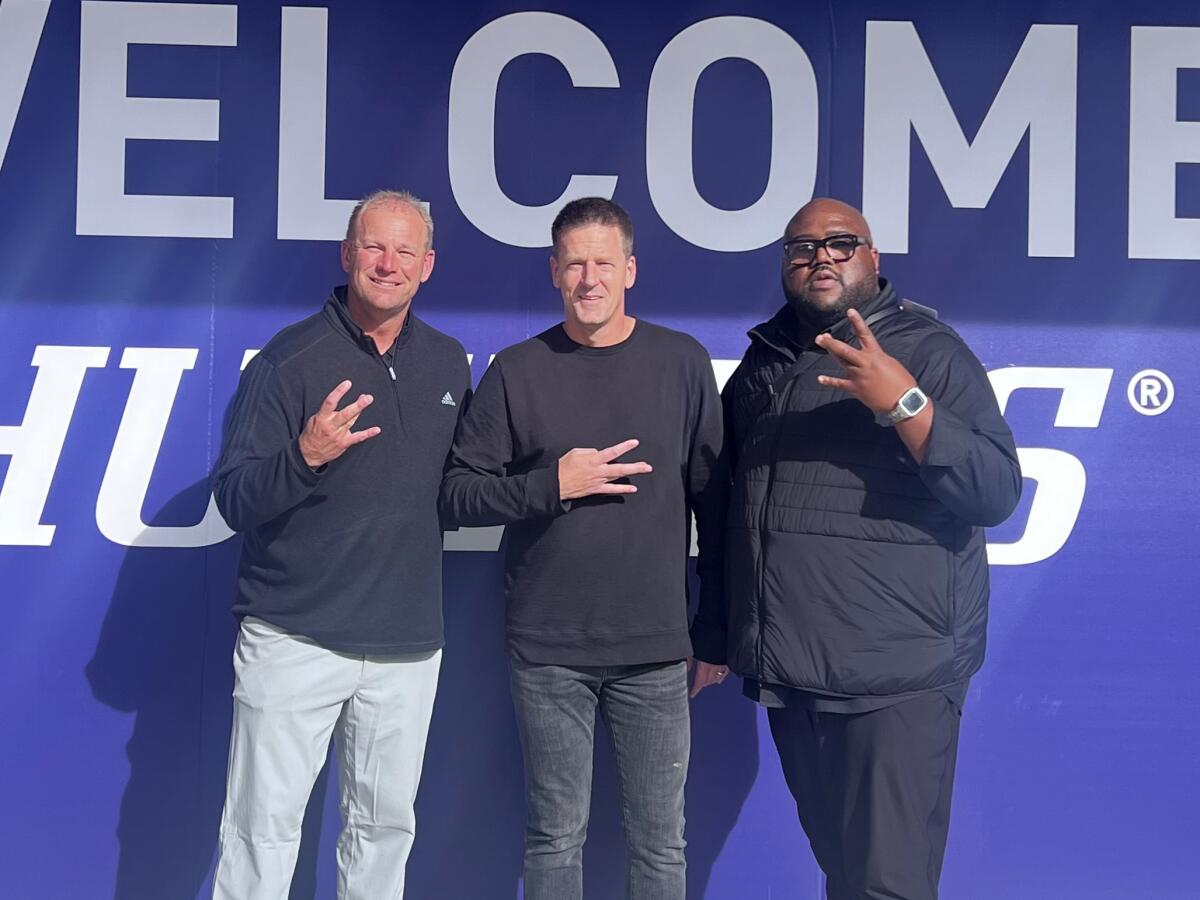
Morgan funneled his hurt into making himself indispensable to Mora’s program.
“I don’t even remember what his title was, but he was in everything,” Mora says. “He had a demeanor and an ability to get along with everybody. As you start to grow more comfortable and gain trust in people, as I did in Courtney, it wasn’t unusual for me to start asking him about anything and everything.”
Says Morgan, “The whole time I was doing that, I would wake up happy because I was doing what I loved to do.”
During his short time back at Michigan, Morgan made his presence felt. He identified defensive tackle Mason Graham, who was then a three-star recruit at Anaheim Servite with no Power Five offers, and pushed Michigan to recruit him. In the Wolverines’ win over Alabama in the Rose Bowl, Graham was named the game’s defensive MVP.
At Washington, Morgan has helped execute DeBoer’s vision for how his program will utilize NIL, which happened to be similar to Harbaugh’s.
USC and UCLA are leaving the mess that is the Pac-12 only to be thrown into what appears a war between Michigan and the Big Ten over sign stealing.
“Our philosophy is to take care of our players and make sure the locker room is intact,” Morgan says. “You don’t want the money to interfere with the culture. Our first thing is roster retention. Make sure the guys in your locker room are appreciated while adding key value pieces to your roster. Now, there’s certain guys you may not get, the big-name kids who are making their decision in the portal strictly off monetary [factors].”
Morgan says that Washington will not take a player from the portal who has not proven himself at the college level. The Huskies are only willing to develop high-school recruits, who better be ready to work for what they earn.
“Our high school NIL is this: we will make sure guys get something, but they’re not going to come in making more than the guys on our team,” Morgan says. “How do we pay a high school kid more money than a guy who’s giving you blood, sweat and tears everyday?”
For perspective, Morgan can tell recruits and their parents his own story. How he sacrificed security and comfort in the short term to be at UCLA.
“The money will come,” Morgan says.
And, in Morgan’s case, so has the influence.
“I just knew his relentless work ethic was going to be something that was going to help us bring the right guys in,” DeBoer says. “I understood his connections and just how he handles people. It’s what I wanted our program to be associated with and how I wanted to be perceived.
“And he probably touches more people out there than anyone on our staff. He’s constantly on the phones. He’s constantly texting and communicating with people. And so he’s a major representative of our program.”
Morgan will have people from around the country rooting for him on Monday night, not just because of the guy he is but what he represents.
“Courtney was willing to do anything it took,” Mora says, “and it’s paying off greatly. I think that’s an inspiration for others. We’re such an instant gratification society now. People will give up a little bit, and Courtney never did. And now he’s the GM for a team that’s playing for the national championship.”
More to Read
Go beyond the scoreboard
Get the latest on L.A.'s teams in the daily Sports Report newsletter.
You may occasionally receive promotional content from the Los Angeles Times.

